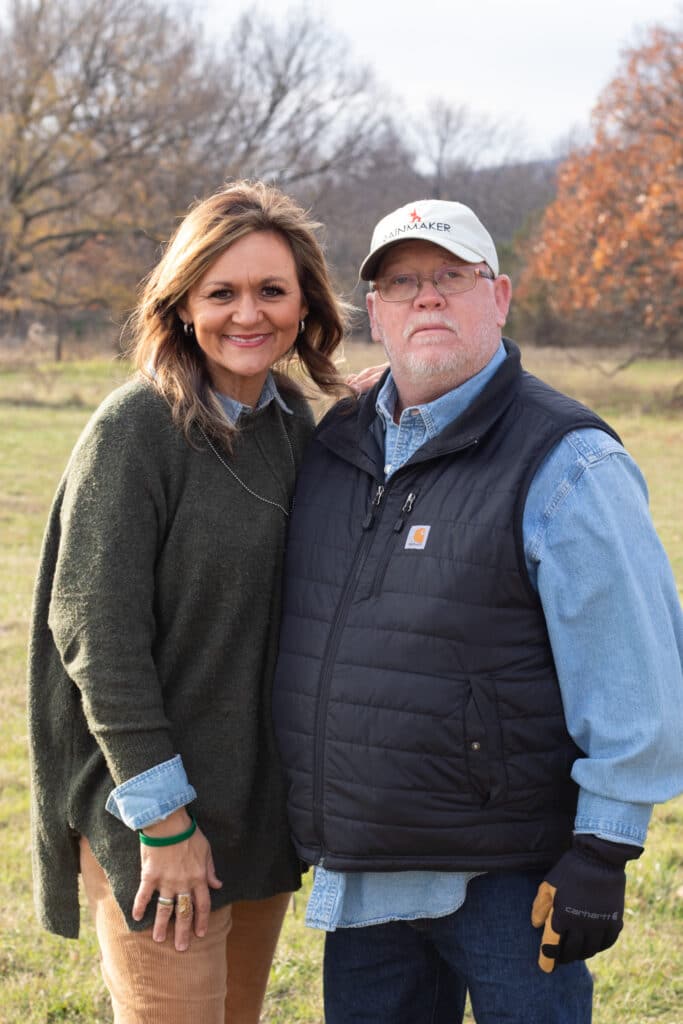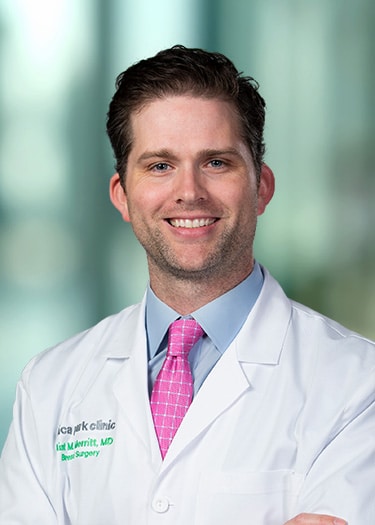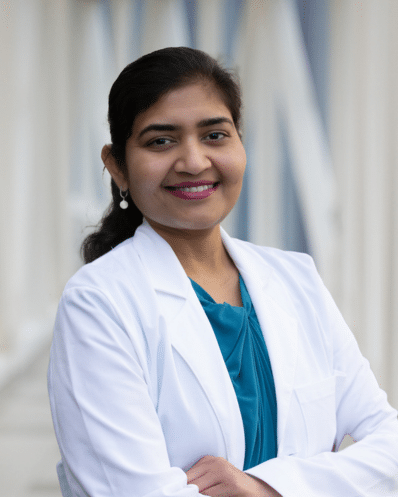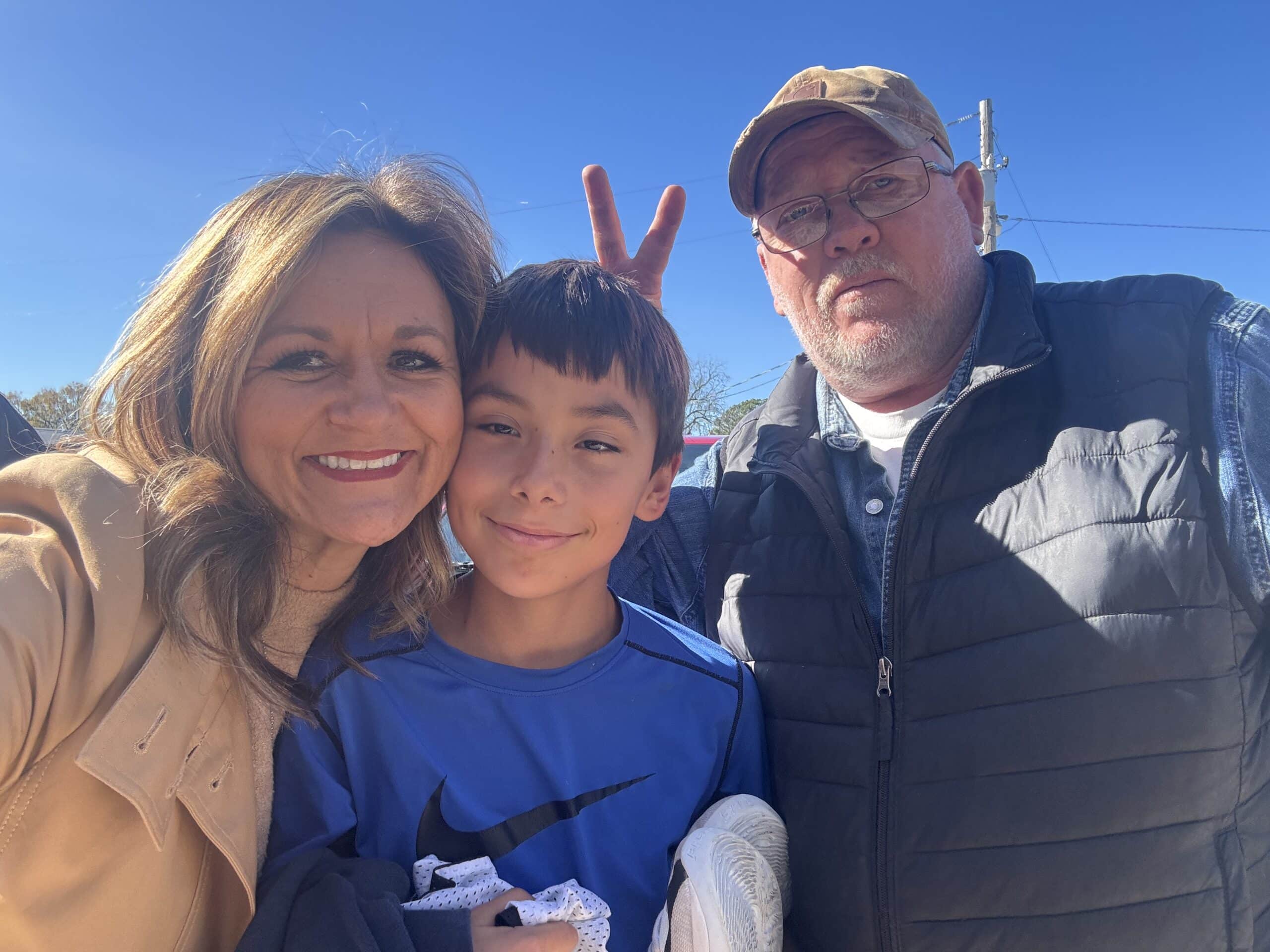A new battle
Andrea McGowan, a 50-year-old mother of three, was initially overwhelmed by test results revealing she had breast cancer. But thanks to the quick and comprehensive care of teams at Utica Park Clinic and OU Health Stephenson Cancer Center at Hillcrest, she is well-equipped to fight it.
McGowan’s doctors saw a spot on her left breast after she had a 3D mammogram in July 2025.

“I had one other biopsy in 2018 that turned out to be non-cancerous, but since then, I’ve had a mammogram every year,” said McGowan. “I have a huge family, a huge support system. But getting this news… at some point, you’re still going to feel alone. But the most important thing is to realize we ALL feel that way, but it’s not true. We must not stay in that place or frame of mind. I always look for the positive and move forward in faith.”
Tests showed McGowan has triple-positive breast cancer, meaning her cancer tested positive for three markers: estrogen receptor (ER), progesterone receptor (PR) and human epidermal growth factor receptor 2 (HER2). This kind of breast cancer accounts for about 10-15% of cases, and, while it can be aggressive, it is also among the most treatable forms of breast cancer.
McGowan’s cancer was caught at an early stage, thanks to her annual mammogram. After her diagnosis, she met with Dr. Clint Merritt, breast surgical oncologist at Utica Park Clinic, to discuss next steps. While Dr. Merritt noted her optimism from their first meeting, McGowan says it is her faith that keeps her afloat.
“[Andrea] came in with a lot of optimism, trying to look at all the positive things,” said Dr. Merritt. “She was 100% positive from the start and did a really great job of staying that way.”
“If it wasn’t for my beliefs and my trust in the Lord, I don’t know how I would make it through,” said McGowan. “For me, it’s all about trusting the Lord and my faith in Jesus.”
Deciding on next steps
Despite worrying about her diagnosis, McGowan felt comforted by Dr. Merritt and his team.
“I just adore him,” said McGowan. “He really just makes you feel like there’s hope. It was a really peaceful feeling, talking to him. He made everything a lot, lot better.”

Together, Dr. Merritt and McGowan weighed her options; she could have a single or double mastectomy to remove one or both of her breasts, a lumpectomy to remove the tumor or could opt for reconstructive surgery. They decided on a lumpectomy to remove the tumor, which she underwent in September 2025.
“She ultimately decided to do the minimal approach,” said Dr. Merritt. “It can be difficult for patients to make these decisions; anxiety is an often-overlooked component of deciding treatment options.”
Dr. Merritt stresses the importance of teamwork between physician and patient to decide what will work best for their treatment, recovery and mental health.
“Unfortunately, anxiety drives more women than it probably should to choosing more aggressive surgery,” he said. “It’s our job as surgeons to inform and reassure these patients, empowering them to make a decision based on education, not anxiety.”
The question of chemotherapy
After her surgery, McGowan went to Dr. Amara Nandikolla, medical oncologist at the OU Health Stephenson Cancer Center at Hillcrest. Additional tests, like checking for genetic predisposition to breast cancer, were performed to see what kind of chemotherapy or other treatments McGowan may need. Together, she and Dr. Nandikolla made a plan.

“I really did not know if we needed to give her pre-operative chemotherapy to shrink the cancer,” said Dr. Nandikolla. “But we were very, very thankful all her testing came back negative. Her cancer cells were driven by a marker called HER2, therefore she needed chemotherapy and the size of her cancer warrants therapy. However, we were glad she needed to be considered for treatment only after surgery and not before. She can get a little less aggressive regimen compared to what we typically give.”
McGowan will undergo 12 weeks of chemotherapy followed by a year of anti-HER2 treatment along with hormone suppressive therapy for at least five years. Her positive outlook and the early detection of her cancer through mammography contributed to her positive prognosis.
“[Andrea is] such a positive person,” said Dr. Nandikolla. “I think that is the reason her outcome is the way it is right now, and she [will] continue to have a very good outcome.”
“Andrea is exactly one of the outcomes we hope to get; an early diagnosis, a successful surgery that is in line with the patient’s wishes and then a quick initiation of other therapies like chemo or radiation, if needed,” said Dr. Merritt. “I tell patients [they] really want to have the full care team on the same page. I think at Hillcrest, we do a great job of [providing] that multidisciplinary care.”
Though the journey from screening to diagnosis to treatment was a mental and emotional challenge, McGowan says the staff at Utica Park Clinic and OU Health Stephenson Cancer Center at Hillcrest put her mind at ease.
“They were all such a blessing,” she said. “It can be an unhappy, stressful place, and they all made it so much easier. They were so kind and compassionate and just made me feel comfortable.”
Life-saving screenings

It is recommended that women over 40 should receive annual mammograms. Women under 40 with a family history of breast cancer should also get checked every year. Any abnormal or concerning findings may warrant more frequent imaging. Patients at high risk for breast cancer may need additional screenings with ultrasounds and/or MRIs annually.
Hillcrest offers three-dimensional (3D) mammography, which gives a layer-by-layer look at breast tissue instead of a flat image provided by traditional two-dimensional mammography. This allows providers to view smaller, fine details in the tissue and identify potential spots of concern.
“In addition to annual mammograms, we never underestimate the utility and benefit of a monthly breast self-exam,” said Dr. Merritt. “I advise women that once [they] get around the age of 30, [they] should really start doing a breast self-exam once a month. You can start those any time and don’t have to wait till 40 to start those.”
For McGowan, catching breast cancer early was a blessing for both her and her family.
“It’s really important to go and have those appointments,” said McGowan. “I’ve been guilty of it, we all have. Reschedule, reschedule, reschedule I’m too busy, I’ll do it later. And thankfully, I wasn’t too busy, I got it done and they were able to catch it early.”
“[Breast cancer] is just a part of my life, this does not define my life. And this does not define me.”
Hillcrest’s partnership with the OU Health Stephenson Cancer Center brings nationally recognized cancer care closer to home. To learn more about the oncology clinics and infusion center, click here. To book a mammogram at one of our seven locations, click here.

